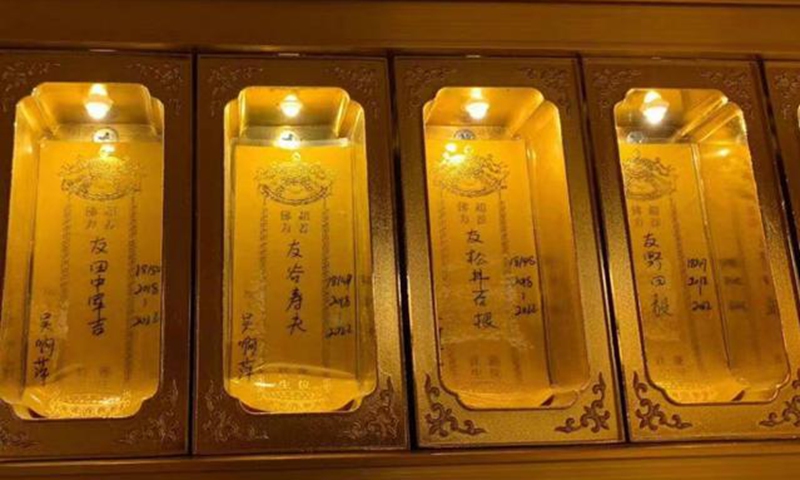
Photo: A screenshot online according to Chongqing Morning Post
The government of Nanjing, capital of East China's Jiangsu Province, on Saturday vowed thorough investigation and zero tolerance in a case where some memorial tablets of Japanese war criminals were found in a local temple and triggered public outrage in China.
The case deeply hurts Chinese people's feelings, which is shocking and caused the huge outrage, read an announcement from the government. Local authorities set up a special investigation group on Friday midnight and held relevant personnel and departments accountable.
It is of an extreme vile nature no matter whoever did it or out of what intention. The government said, vowing thorough investigation and zero tolerance.
The awful Nanjing Massacre is the darkest page of Nanjing's history. On this land where 300,000 Chinese civilians and disarmed soldiers were brutally murdered, no behavior to "memorialize" perpetrators will be tolerated, the government said.
The case caught public attention on Thursday after a netizen took to social media platforms and said memorial tablets of at least four notorious Japanese war criminals who were involved in the Nanjing Massacre during the War of Resistance against Japanese Aggression (1931-45), including key perpetrators Matsui Iwane and Hisao Tani, were enshrined at the Xuanzang Temple in Jiuhua Mountain Park.
Iwane was the commander of the Japanese forces occupying Nanjing and a Class A defendant, who was executed by hanging in 1948.
Hisao Tani was a commander of the Japanese Army's Sixth Division during the War of Resistant against Japanese Aggression. The Second Historical Archives of China, which is also based in Nanjing, has the written court verdict of the principal culprit of the massacre, Tani.
According to the verdict: "The evidence is certain" Tani and his troops "committed mass murders, rapes, looting and wanton destruction." The atrocities, such as punching, beheading, gang rape and burning people alive "are unparalleled and extremely violent." Tani was sentenced to death and was executed on April 26, 1947, in Nanjing.
The names of notorious war criminals Takeshi Noda and Gunkichi Tanaka were also seen on the memorial tablets. Noda was a Class-C war criminal who participated in the "killing 100 people" competition in Nanjing. Tanaka was a senior captain and a company commander of the Sixth Division who killed more than 300 civilians and prisoners of war in the city.
Another point that irritated the public is that the Xuanzhuang Temple itself was also related to the history of Japanese troops' invasion in Nanjing. In 1942, the relics of the Xuanzhuang monk, a Chinese monk of the Tang Dynasty (618-907) who made a 17-year journey to bring Buddhist teachings from India to China, were found in the Jiuhua Mountain. The Japanese troops wanted to appropriate the relics to themselves but encountered strong opposition from Nanjing residents so that they could only give up the plan.
A temple named Sanzang Temple was established in 1943 to worship the relics and the renamed Xunzhuang Temple was in 2003. It has been a base for adolescent patriotism education since 2004.
Amid public outrage, the Nanjing authorities had taken quick reactions. On Friday, local authorities announced that the abbot of the temple had been dismissed and the temple was required to stop daily operation. At least three officials from the religious departments were punished including the Xuanwu district ethnic and religious bureau chief in Nanjing.
Jun Zhengping, an account affiliated with the Chinese People's Liberation Army on Weibo, said on Friday night that the incident has once again sounded the alarm for the nation: the struggle against militarism and historical nihilism is still long and complicated, and we must be vigilant and resolutely defend the spiritual highland of the Chinese nation.
Global Times




